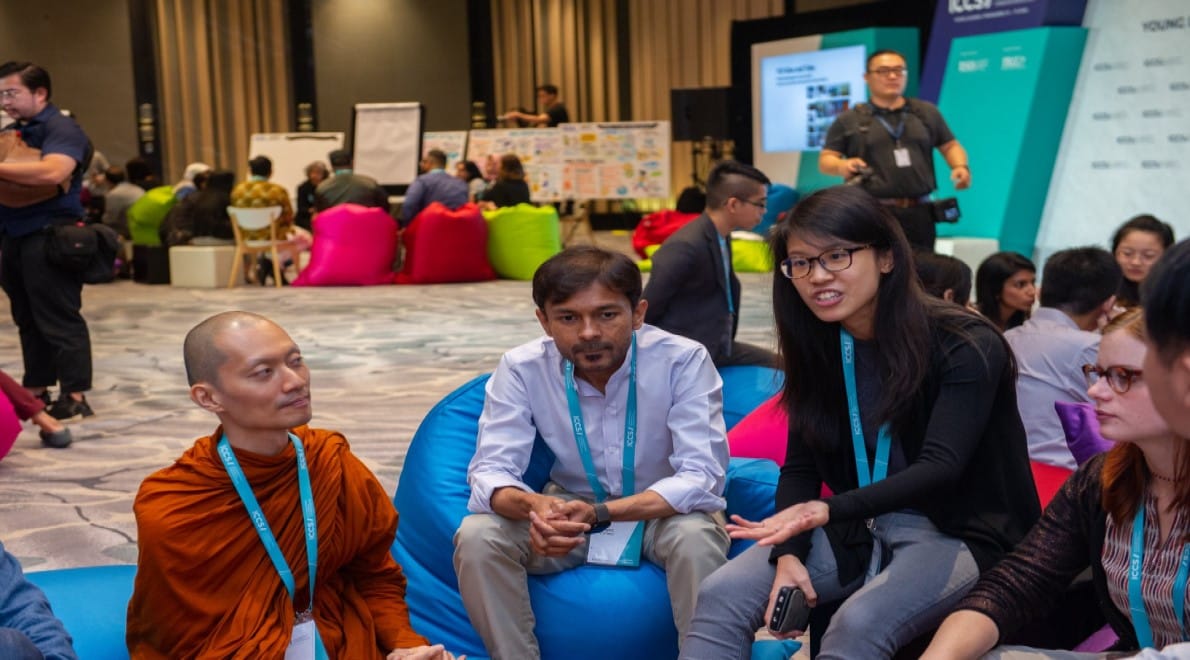Many Communities, One Shared Future
Many Communities, One Shared Future
In a world that is becoming increasingly polarised, more needs to be done to bring people together. We hear from two delegates who participated in the International Conference on Cohesive Societies (ICCS) 2019, supported by Temasek Foundation. They shared their personal experiences on how diversity has benefitted society.

Ms Teh Yi Ying, a Young Leaders' Programme delegate at the ICCS 2019, forges greater understanding among participants through the sharing of personal encounters and ideas for social harmony in the face of growing divisions. Photo: Teh Yi Ying.
Ms Teh Yi Ying initially joined the Young Leaders' Programme (YLP) as a participant. But she was offered an opportunity to help as a YLP facilitator.
“What I hope to achieve is to create the space for interesting conversations to take place, and to help people who might not feel as confident, to speak up,” said the 26-year-old.
Citing ICCS 2019, which had an “unconference format” where delegates proposed the topics they wanted to discuss, Ms Teh noted that such conversations help to bring people together.
“The participants were very motivated and wanted to talk, which really spearheaded the discussion. I was just holding the space for these conversations to take place,” she said.
As a volunteer with Explorations into Faith, a community that champions interfaith dialogue, she recalled when a Muslim and a Christian talked excitedly about the feelings of peace and closeness to the divine on their respective pilgrimages.
“I think social cohesion is about the everyday moments. It is about the personal encounter, a very organic encounter that transforms someone internally.”
The light in their eyes and that sense of mutual understanding was quite something ... There are so much more commonalities than we think.
Ms Teh Yi Ying, Young Leaders' Programme Delegate, International Conference on Cohesive Societies 2019
Creating Space for Conversations
Mr Malminderjit Singh stood out during his National Service days, as he not only did not shave his hair as a recruit but also wore a turban.
This caused him to be picked on – but in a good way.
“I noticed that due to me being more visible and standing out a lot more, I was called out a lot more by my officers and superiors to do various tasks,” recalled the 40-year-old who heads the editorial and new media team at the National University of Singapore Institute of South Asian Studies.
“These were great for me as I had more opportunities to perform, create a positive impression and develop my leadership potential.”
Mr Singh is a Sikh, one of the smallest religious groups in Singapore. The men do not cut their hair, which is neatly tucked into a turban, for religious reasons. But being a minority has not led to discrimination.
As a Young Leaders’ Programme (YLP) delegate at ICCS 2019, he believes more initiatives, such as the conference, are needed to bring people together and nurture cohesive societies.
“ICCS could be the premier platform that government leaders, policymakers, practitioners and thought leaders use to not only meet, network and exchange ideas, but also to amplify the need for and ways to achieve stronger cohesiveness around the world,” he noted.
“The networks and bonds built between us will be invaluable in fostering collaboration, having relationships built on trust and familiarity as well as remove barriers.”
While Singapore has been fortunate to be free of any major race or religious conflicts, the nation is also “far from being perfect”. He singled out two areas for improvement.
One, turning tolerance into respect.
If we don't turn tolerance into respect more effectively, we will have occasional issues ... that reveal the cleavages in our society, however shallow these may be. Such incidents if left unchecked, may over time result in deeper fault lines.
Mr Malminderjit Singh, a Young Leaders' Programme Delegate during ICCS 2019
Two, improving awareness and forging a greater understanding of each other’s race and religion for deeper understanding.
Singaporeans readily celebrate each other’s festivals and savour each other’s food. However, he observed: “We need to make sure that we know what are the meanings and significance of these traditions, customs and practices so that we have a better appreciation of our diversity.”
What is ICCS 2019?
Held between June 19 and 21, it is the first international conference that aims to drive global collective action for peace and harmony through the strengthening of cohesive societies and interfaith harmony.
Participants included 1,000 academics, government officials and members of religious and civil society groups from almost 40 countries.
The conference is organised by S. Rajaratnam School of International Studies (RSIS) and supported by the Ministry of Culture, Community and Youth. Temasek Foundation is the supporting partner of the conference.
